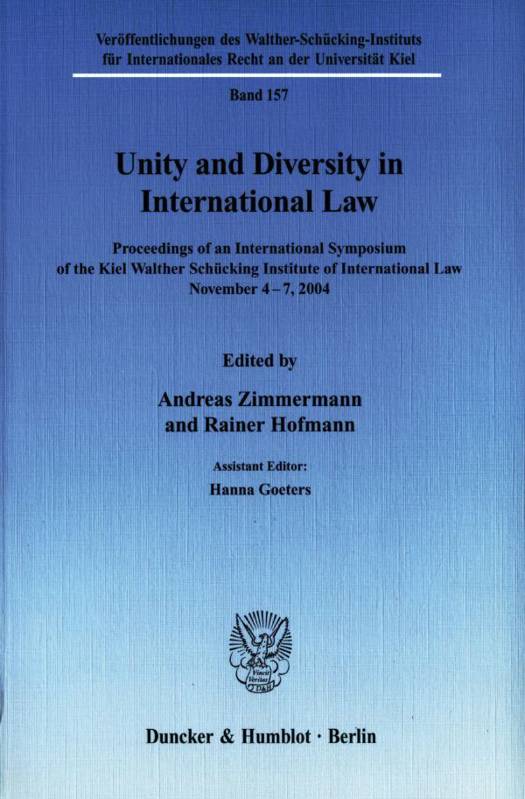
Bedankt voor het vertrouwen het afgelopen jaar! Om jou te bedanken bieden we GRATIS verzending (in België) aan op alles gedurende de hele maand januari.
- Afhalen na 1 uur in een winkel met voorraad
- In januari gratis thuislevering in België
- Ruim aanbod met 7 miljoen producten
Bedankt voor het vertrouwen het afgelopen jaar! Om jou te bedanken bieden we GRATIS verzending (in België) aan op alles gedurende de hele maand januari.
- Afhalen na 1 uur in een winkel met voorraad
- In januari gratis thuislevering in België
- Ruim aanbod met 7 miljoen producten
Zoeken
Unity and Diversity in International Law
Proceedings of an International Symposium of the Kiel Walther Schucking Institute of International Law, November 4-7, 2004
€ 233,95
+ 467 punten
Omschrijving
This publication is the result of a symposium held in 2004 at the Kiel Walther Schucking Institute for International Law on the occasion of its 90th anniversary. In 2000 the International Law Commission of the United Nations in its preliminary study on dangers associated with conflicts between various normative subsystems of international law stated that the fragmentation of international law could endanger the stability as well as the consistency of international law and its comprehensive nature. It is against this background that this volume contains an in-depth analysis as to whether divergent trends have emerged, and if so to what extent, with regard to the sources of international law, its subjects, questions of State responsibility and dispute settlement with regard to the law of the sea, international humanitarian and international criminal law, human rights, international environmental law and international economic law. Besides, the book also addresses the question whether, and if so which, rules have developed to cope with conflicts between the various subsystems just mentioned. It therefore constitutes an essential contribution to the ongoing and crucial debate on the fragmentation of modern public international law.
Specificaties
Betrokkenen
- Uitgeverij:
Inhoud
- Aantal bladzijden:
- 496
- Taal:
- Engels
- Reeks:
- Reeksnummer:
- nr. 157
Eigenschappen
- Productcode (EAN):
- 9783428120192
- Verschijningsdatum:
- 6/01/2006
- Uitvoering:
- Paperback
- Formaat:
- Trade paperback (VS)
- Afmetingen:
- 155 mm x 231 mm
- Gewicht:
- 643 g

Alleen bij Standaard Boekhandel
+ 467 punten op je klantenkaart van Standaard Boekhandel
Beoordelingen
We publiceren alleen reviews die voldoen aan de voorwaarden voor reviews. Bekijk onze voorwaarden voor reviews.








